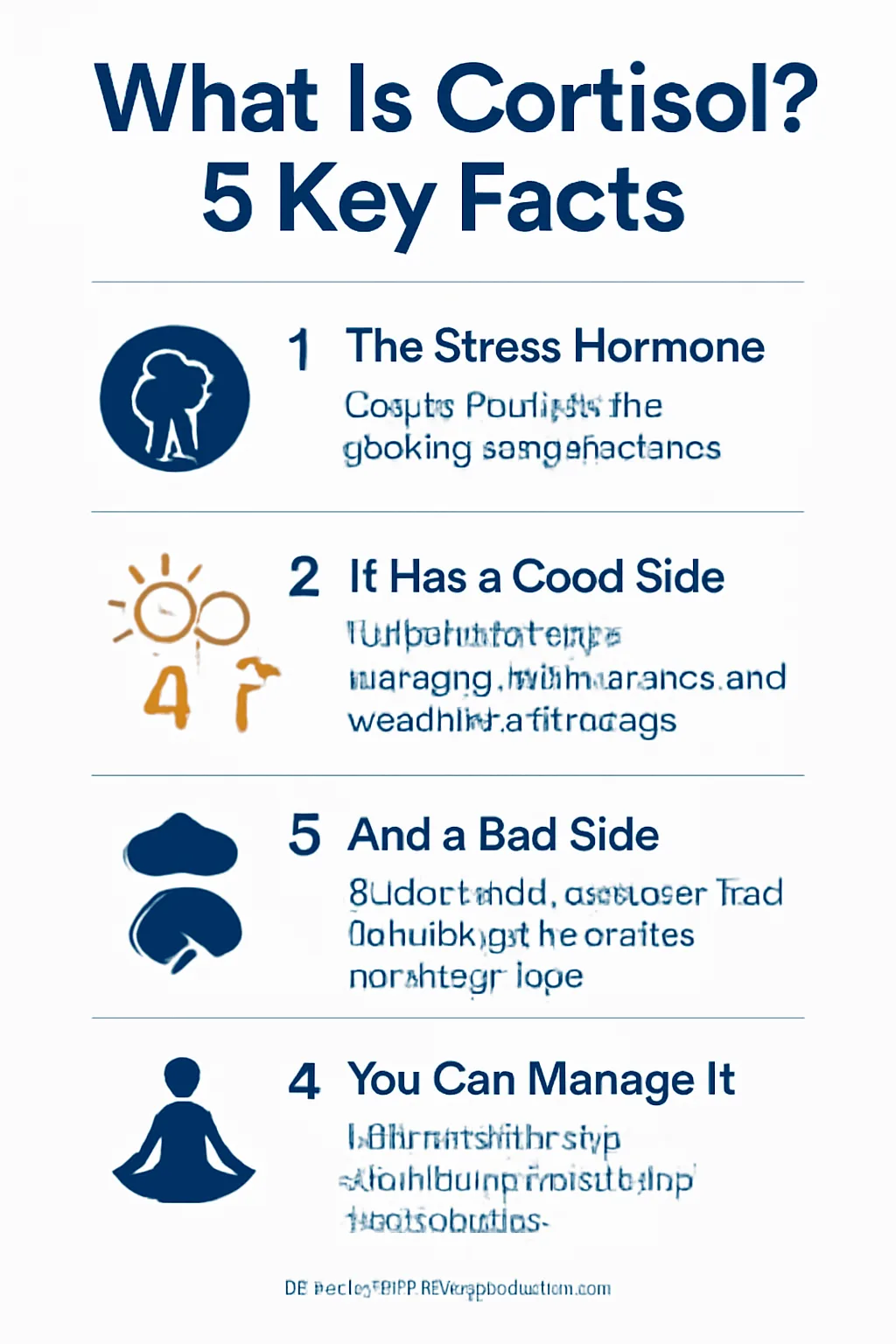
Educational infographic answering "what is cortisol" with 5 essential facts about the body's primary stress hormone and its impact on health.
What Is Cortisol? 5 Key Things You Need to Know
Key Takeaways
- Cortisol is the body’s primary “stress hormone,” produced by the adrenal glands to help you respond to perceived threats.
- While essential for survival, chronically elevated cortisol from modern-day stress can negatively impact weight, sleep, energy, and mood.
- Understanding **what is cortisol** and its functions is the first step toward managing its levels effectively.
- Management strategies include lifestyle changes, diet, and targeted supplements designed to support the body’s stress response system.
What’s Inside This Guide?
1. What Is Cortisol, Exactly? The “Fight-or-Flight” Hormone
You’ve likely heard the term “stress hormone,” but **what is cortisol** really? Cortisol is a steroid hormone produced by your adrenal glands, the small glands sitting atop your kidneys. Think of it as your body’s built-in alarm system. When your brain perceives a threat—whether it’s a tiger in the wild or an urgent deadline at work—it triggers the release of cortisol.
This release is part of the “fight-or-flight” response. Cortisol floods your body with glucose (sugar) to provide an immediate energy source to your large muscles. It also inhibits functions that are non-essential in a crisis, such as digestion and the immune response. In short, it primes your body for immediate, physical action. This process is brilliant for short-term survival, but it was not designed to be active all day, every day. Understanding this basic function is key to knowing **what is cortisol**.
2. The Two Faces of Cortisol: When Good Hormones Go Bad
Under normal circumstances, cortisol levels follow a natural daily rhythm. They are highest in the morning (around 8 AM) to help you wake up and feel alert, and they gradually decrease throughout the day, reaching their lowest point around midnight to allow for restful sleep. This is cortisol working as intended—a helpful, life-sustaining hormone.
The problem arises when the stressors of modern life—work pressure, financial worries, lack of sleep, poor diet—keep your body in a constant state of high alert. This leads to chronically elevated cortisol levels, a condition where the “alarm system” never shuts off. When this happens, the very hormone designed to protect you begins to cause harm, leading to a host of unwanted symptoms.
3. Key Signs Your Cortisol Levels Might Be Too High
How do you know if your stress response is working overtime? Your body often sends clear signals. Understanding **what is cortisol** involves recognizing these symptoms:
- Persistent Fatigue: Feeling tired and wired at the same time, especially waking up exhausted.
- Unexplained Weight Gain: Particularly around the abdomen, as cortisol encourages the storage of visceral fat.
- Brain Fog: Difficulty concentrating, memory lapses, and a feeling of mental slowness.
- Sleep Disturbances: Trouble falling asleep or waking up frequently during the night.
- Increased Cravings: A strong desire for sugary, fatty, or salty foods.
- Mood Swings: Feeling irritable, anxious, or down without a clear reason.
If this list sounds uncomfortably familiar, it may be a sign that it’s time to take managing your cortisol levels seriously. For a deeper dive into this topic, you can read our expert guide on the best cortisol reduction supplements.
4. How Can You Manage Cortisol Levels?
The good news is that you have significant power to influence your cortisol levels. Management is a holistic process that involves lifestyle adjustments and, for some, targeted support. The primary strategies for anyone asking **what is cortisol** management include:
- Stress Management Techniques: Practices like meditation, deep breathing, and mindfulness have been clinically shown to lower cortisol.
- Regular, Moderate Exercise: Physical activity is a great stress reliever, but over-exercising can actually raise cortisol. Balance is key.
- Prioritizing Sleep: Aiming for 7-9 hours of quality sleep per night is crucial for allowing cortisol to follow its natural rhythm.
- A Balanced Diet: Reducing sugar and processed foods while increasing intake of whole foods can support hormonal balance.
- Targeted Supplementation: For those needing extra support, certain natural compounds known as adaptogens can be highly effective. These herbs help the body’s systems adapt to and resist stress.
An Example of Adaptogenic Support
When exploring supplements, it’s important to look for formulas that use clinically-studied ingredients. For instance, a product like **CortiSync** is built around Sensoril®, a patented form of the adaptogen Ashwagandha. This specific extract has been shown in human clinical trials to help the body manage stress and reduce cortisol levels, offering a science-backed approach to regaining balance.
5. Frequently Asked Questions About Cortisol
What is cortisol produced by?
Cortisol is a steroid hormone produced and released by the adrenal glands, which are small glands located on top of your kidneys. Its production is controlled by the brain’s hypothalamus and pituitary gland.
What is the main function of cortisol?
Cortisol’s main function is to help the body respond to stress. It also plays a key role in regulating metabolism, reducing inflammation, controlling the sleep-wake cycle, and managing blood sugar levels.
What happens when cortisol is too high?
When cortisol levels are consistently too high, it can lead to several health issues, including weight gain (especially in the abdomen ), high blood pressure, muscle weakness, mood swings, and difficulty sleeping.
Can you have symptoms of low cortisol?
Yes, low cortisol can also cause problems, such as fatigue, dizziness, muscle loss, and mood changes. This condition is less common and often related to adrenal insufficiency, requiring medical attention.
These statements have not been evaluated by the Food and Drug Administration. This product is not intended to diagnose, treat, cure, or prevent any disease. Results may vary. Always consult with a healthcare professional before starting any new supplement regimen.
Last reviewed: July 2025









